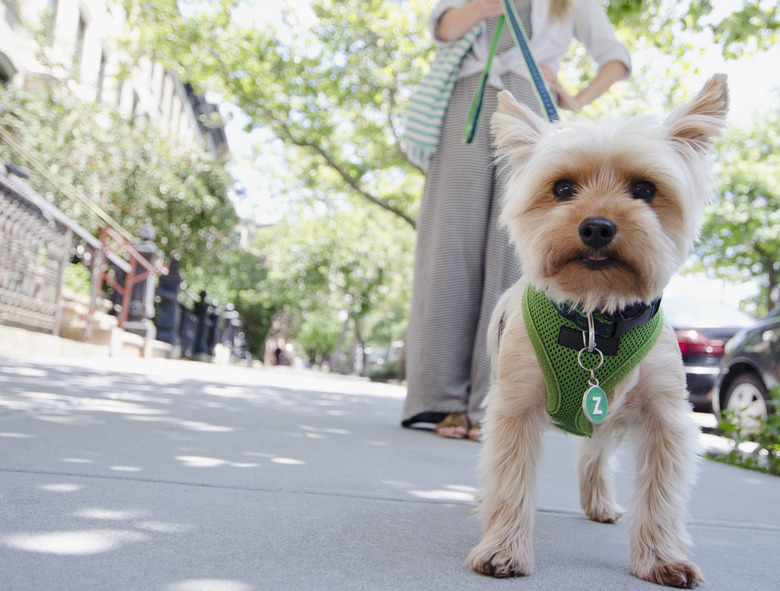What Fruits & Vegetables Can Yorkies Eat?
What can Yorkies eat? Yorkshire terriers can eat any fruits and vegetables that are safe for dogs, but you need to check before you serve, as poisonous and toxic foods will affect small dogs quicker than large-breed dogs. Even though dogs don't need fruits and veggies the way people do, they make for healthy and refreshing treats. Finding the right fruits and vegetables for your dog is tricky, as some are dangerous, and picky eaters may not really like the taste of others. Always feed small pieces in moderation as an occasional treat to help avoid an upset stomach.
What fruits can Yorkies eat?
Yorkies can eat pears, pineapples, raspberries, strawberries, bananas, cantaloupe, cranberries, mangoes, peaches, and oranges. Yorkies do not necessarily need to eat fruit, as they get all of their required nutrients from a high-quality dog food, However, a tasty fruit treat is likely more healthy than store-bought treats with byproducts and fillers, and can be convenient if you just so happen to be making yourself a snack. It is important to refrain from giving fruits to diabetic dogs due to the high sugar content affecting their blood sugar.
Apples are full of fiber and vitamins A and C — just remove the core, seeds, and skin to make it easy for your Yorkie to eat it. Foods high in vitamin C can change urine acidity. If your Yorkie is prone to bladder stones and is on a prescription diet, discuss the best dog food options with your veterinarian before offering them any fruits or vegetables high in vitamin C. Watermelon is a refreshing summer treat as long as you de-seed it. Blueberries are an especially good treat since they are high in antioxidants and good for their immune system.
Make sure to buy organic fresh fruit to minimize the presence of preservatives and pesticides. Always rinse off fruits before serving them.
What vegetables can Yorkies eat?
Your Yorkie needs vitamins and nutrients to live a healthy life, and certain vegetables are loaded with exceptional vitamins and minerals that will help them. Foods high in vitamin C, fiber, and calcium, such as broccoli and zucchini, can affect urine composition and should be discussed with your veterinarian if your Yorkie is prone to or being treated for bladder stones or bladder crystals.
Sweet potatoes are packed with vitamins A, B6, and C as well as iron and calcium. They are also a source of carbohydrates. Yorkshire terriers, along with pretty much any of the dog breeds, can enjoy the health benefits of green beans, which include folate; calcium; iron; and vitamins A, C, and K. Cucumbers and celery are also amazing low-calorie snack options.
Large veggies can be served steamed and boiled as long as there's no salt or seasoning added to them. Always scale down these veggies to small, chewable pieces for your Yorkie in order to prevent a choking hazard.
What should Yorkie puppies or an adult Yorkie not eat?
Generally speaking, you shouldn't feed human food to dogs of any breed, size, or age, as they digest food differently and often can't process what humans eat. Yorkshire terriers are a small-breed dog and part of the toy group, and their small size means that the ingestion of poisonous or toxic foods can affect them quicker than large breeds.
Many people are familiar with the knowledge that chocolate is toxic to dogs. While this is true, chocolate is not the only dangerous food for your Yorkshire terrier. Puppies and adult dogs should never be fed fruits that contain large seeds or pits or vegetables that are too hard and thick to chew properly, like asparagus. Cherry pits contain cyanide, so they must be pitted before being offered to the dog. Avocados, tomatoes, and potatoes with green skin should be avoided because they contain a toxin called solanine. Onions and garlic are poisonous to dogs, while macadamia nuts, grapes, and raisins are toxic.
If you are unsure about a specific fruit or vegetable, make sure to speak with your veterinarian.
How to safely feed Yorkshire terriers fruits and veggies
If you feed your pet high-quality dry dog food, you probably do not need to supplement your Yorkie's food with fruits and vegetables. While dogs are omnivores, they don't need fruits and vegetables in the quantity that humans do. However, certain kinds of fruits and vegetables are healthy snacks for dogs of all breeds.
As with any food, you should carefully monitor your dog's reaction for potential health problems or allergies. Serve them small pieces of any fruit or vegetable they've never tried before. Make sure to always give dogs snacks in moderation.
Yorkshire terriers are prone to developing bladder stones and crystals. If your dog has been diagnosed with either of these, ask your veterinarian what your dog needs before offering any fruits, vegetables, or treats like rawhides. If your dog is currently eating a prescription diet, refrain from giving them any food or treats besides the special diet unless your veterinarian says it is OK. If your dog is diabetic, avoid fruits high in sugar and veggies high in carbohydrates so they don't negatively affect their blood sugar.
The bottom line
There are many fruits and veggies that toy breeds like your Yorkie can safely eat as part of a healthy diet in addition to their kibble or wet food, but there are several that may be toxic and should be avoided. Since Yorkies are small dogs, eating something dangerous can affect them more due to their lower body weight. If your Yorkie dog has a predisposition for developing bladder stones or another health condition, such as pancreatitis, obesity, or kidney failure, you need to be extra careful with what they eat and should discuss your dog's diet with your veterinarian. If your dog has a bad reaction to food or if you think they ingested something toxic, contact your veterinarian immediately. Calling a 24/7 animal poison control center can also provide you with immediate guidance.



